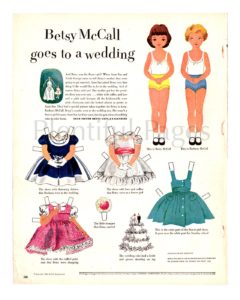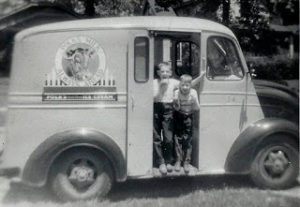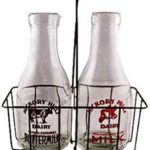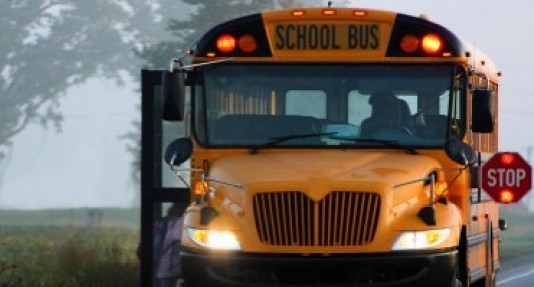Stopped by flashing lights
After a leisurely hike with a friend recently, I was traveling home on a busy rural road when dreaded flashing lights stopped my progress. My car was in front of a line of traffic moving toward the bus, and as I slowed to stop, I noticed a long line of headlights from the cars that were following behind the bus. There was a no place for a school bus to pull over on this stretch of road, and I rolled my eyes in gratitude that I was not traveling in that long line.
Then, as we all waited to be moving again, the door opened to discharge students. But, no one got off.
As I peered in the nearly empty bus to see if I could spot the hang-up, I saw the outline of a child, at first sitting behind the driver and talking. Then she was standing.
And still talking.
Had my friend Donna been stopped, her Prius would have turned off automatically to save energy, and she would be looking at the countryside and noticing the stark outline of an oak tree in the distance. Donna is an artist, and she often gazes.
I do not drive a Prius. My car has “sport” in its name, and I’m not crazy about being held up, even when I don’t have a deadline. It could be a character flaw, but that’s the way it is.
So as I sat waiting, I silently urged the child, “It’s time to get off that bus!” But my fervent telepathy was not effective.
Finally, I saw the girl’s feet hit the roadway. However, rather than make her way up the driveway, she turned and kept talking. The driver waved encouragement for her to say goodbye, but the child stood there. Talking.
When she finally turned her back on the bus, the girl’s shoulders slumped, and she started a slow walk up to the house.
I nodded silently, knowingly.
And then I let out a big sigh and gave a friendly wave to the driver as I started to travel on my way. While I drove, I remembered the drivers in childhood who I didn’t want to leave.
Struggling for connections
When I was seven-years-old and attended second grade at the Potter School for sick and frail kids, some of the taxi drivers who took me to and from school would let me sit in the front seat where I could see the road and chat away.
Some cabbies were just drivers, but others seemed to enjoy making observations as we passed by. I learned about “deciduous” trees from a driver who had me practice saying the word as he told me about the hazards of people not raking their leaves away from the storm drains.
At a stoplight on busy Michigan Street, I learned how useful a squirrel’s tail was, “See the squirrel up there on those telephone lines? Using the squirrel highway to get across the road.”
“Won’t he fall?”
“Oh, his fluffy tail helps him keep his balance. See how he moves it gently as he goes? They live in trees, and they don’t fall. It would be a lot scarier if he tried to cross the street on the ground!”
With each bit of information that a cabbie shared, I felt important and soothed by the attention, so I missed those riding connections when the school year ended.
Back at my home school
When I returned to Irvington Elementary for third grade, I walked to school where it seemed like life was humming along without me. As I tried to fit in, I must have avoided disaster because I don’t have one happy, unhappy, satisfying, or unsatisfying memory of that year other than the “duck and cover” air raid drills. These were to help us “survive” a Cold War atom-bomb attack.
I remember being terrified by a short movie that was designed to help us avoid horrible burns after we heard a bang or saw an awesome flash. We learned that the capital building was the primary target in our area, and since we would be on a ring six miles away from the bullseye, our main risk was from radiation burn, not being blown to smithereens in the blast. But I worried that enemy pilots could have lousy aim and create a terror right where I lived.
Duck and Cover isn’t a comforting memory from third grade, but it is all that I have. However, that is enough to have me ache when I think of the effect that “active shooter” drills must have on students today.
Ernie was hanging around
When summer arrived that year, I tried to get out of the house as much as I could. I like being outdoors and moving fast whenever I can.
But that summer, there was also another reason for wanting to be outside.
My foster brother, Ernie, remained at home after leading his team to the state basketball championship. In the Hoosier State, basketball was the pinnacle of high-school achievement. Ernie was a good-looking guy who was elected king of this and leader of that.
Mother made a brown and gold cheerleading costume for me to wear at Ernie’s games, and I learned the cheers and chants. She urged me to go down and stand by the real cheerleaders, but I was too uptight to venture out of my seat.
I didn’t feel like cheering for Ernie anyway.
Ernie had enlisted to go into the navy later that summer, and as he hung around, he would golf, occasionally work for my Dad, and lounge.
At least three years earlier, as my parents worried about my health and urged me to try and sleep longer, I let them know that Ernie and another foster brother took turns waking me at night when my parents left them in charge. Since the boys were ready babysitters, my folks often visited and played canasta with neighbors across the street after my little brother and I were in bed.
After my parents and a social worker confronted the boys, Ernie minimized as his role as expressed great remorse, and he promised never to do that again.
The male social worker and my folks thought it would be a shame to move Ernie since he was thriving at high school and destined for basketball stardom. They also believed that I was too young to remember much for long.
Back in those days, men decided what children should feel.
Ernie had been keeping his word for over three years. But, when I was around him, the textures of his junk and its musky smell would blow-up in my memory. I just wanted him gone.
One day Mom suggested that I go and walk along with Ernie as he played nine holes of golf since he would be living soon and she thought it would be good for me to spend time with him. I was a kid who tried to match expectations, so I reluctantly went along.
As I walked pulling his golf cart, an errant drive from another golfer hit my lower leg, and Ernie carried me to the clubhouse for ice. I hated the ride but welcomed the numbing cold.
After my doctor determined that nothing was broken, I wore my purple knob with pride. It was also a reason never to go golfing with Ernie again.
Biding time until the outdoors was mine
That summer, Mom wouldn’t let me go outside to play until after 9:30 in the morning, so after I practiced the piano, I often killed time at the kitchen table with coloring crayons or paper dolls. A highlight for me was the day after a new McCall’s magazine arrived. I could cut out the latest outfits and add them to my collection.
The world of Betsy McCall and her friends seemed so distant from my life of strict religious observance and sensible second-hand clothes, so I sorted new outfits longingly and wished I could have just one pair of frivolous shoes.
Milk Delivery Runner
As I hung out in the corner of the kitchen, on Tuesdays and Fridays, I listened for the rattle of our milk box as the milkman placed our regular order. Mom would leave a slip marked for extra items like butter or cream, and when I heard the milkman, I would run out and go with him down stone steps to the alley and bring the extra order back to the kitchen.

One day, the milkman offered to let me ride to his next two stops on the alley. As he lined up the orders, I ran back to the house and begged to go along.
Milkmen were often kind to neighborhood children, so Mom’s only concern was about my warmth.
As the milkman drove me to those two stops, he must have noticed a little girl who got excited about not much. So he asked if I wanted to help him make deliveries to the neighborhood east of my house.
Of course, I did!
Satisfaction
If the weather was nice enough for Mom to let me help the milkman, it was warm enough to ride with the milk truck doors wide open. Indianapolis summers could be muggy, even in the morning, so that breeze was part of the pleasure. The milkman always reminded me to, “Hold on tight” before we turned onto Pleasant Run Boulevard and we could pick up speed.
Pride blew through my hair knowing he believed that I could hang on.
At a delivery stop, the milkman would load up one or two wire carriers with the customer’s standard order. I could carry up to two quarts of milk or cream in each carrier, so any order that contained more than a gallon required me to make two trips.
More running was fine with me, even when I had that swollen leg.
When I got to the house, I was to place the empties on flat solid surfaces until I put them in the baskets. Then I ran to the truck and got the additional items to keep up an efficient operation.
When we completed deliveries, the milkman dropped me back by our front door and my glorious get-away for the day was over. As I left the truck, I’m sure I jabbered with the driver one last time before I turned and walked away.
That summer, I carried milk without a hitch, but I never managed to haul the milkman’s confidence along into the house.
Postscript
Like all folks who have lived a long time, I’ve been helped by thousands of teachers, neighbors, friends, classmates, and acquaintances who paved the road to where I am today. Sometimes there were detours and stumbling blocks, but when I was a child who needed it, kind cabbies and a milkman helped carry me. And when their rides were over, I didn’t want to say goodbye.
Now, whenever I see someone listening to a child, I hope I’m never too rushed, or too old, to send a thought of loving-kindness his or her way. Usually, all I will be able to give is a wave and a warm wish through the universe, but I will send it with a knowing smile and a prayer of gratitude for those in my past who let me chat away.
Endlessly.
Picture of boys: http://vintageirvington.blogspot.com/2013/04/the-milk-truck-on-beechwood-1948.html
